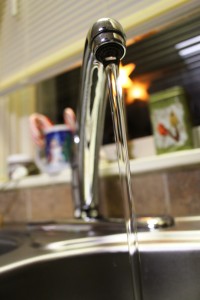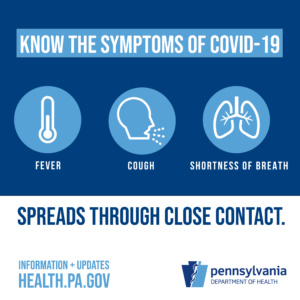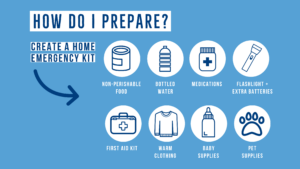WTMA Failed to Identify and Test Proper Number of Homes for Lead; Sampled Select Homes Twice
(Lititz, PA-LititzDailyNews.com)—The Pennsylvania Department of Environmental Protection recently issued violations to Warwick Township in Lancaster County for breaking federal and state regulations that govern testing for lead in drinking water, according to a notice provided by the state to LititzDailyNews.com yesterday.
Residents in this small central Pennsylvania community named the 2013 “Coolest Small Town in America” by a travel magazine are still reeling from news received Tuesday that Lititz-area children have shown a higher rate of lead poisoning than Flint children, even after the switch to the Flint River.
The lead level reported to residents in the last round of testing in 2013 for one Warwick water system is identical to the level reported by officials to residents of Flint for the first six months of 2015.
“After a thorough review of the system histories, the department has determined that Warwick violated the Safe Drinking Water Regulations,” states the March 17 notice sent by the state to Warwick Township manager Dan Zimmerman. The township operates two municipal water systems that deliver water to thousands of residents in Lititz and Rothsville.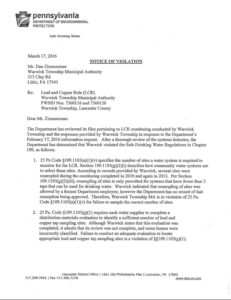
Warwick Township failed to correctly conduct required sampling for lead and copper during 2010 and 2013 in both the Lititz and Rothsville systems, according to the notice signed by David Linton, A drinking water supervisor for the state. The Pennsylvania Department of Environmental Protection.
Warwick Township failed to test the correct number of homes for lead, tested some homes twice in the same year, and failed to conduct a search to locate appropriate test sites.
“If you’re not testing the worst-case homes, the sampling is worthless.”-Marc Edwards, Virginia Tech professor
A LititzDailyNews.com investigation uncovered documents in February showing that instead of testing 30 homes in the Lititz system as required in 2010, the township tested only 25 homes. It still reported 30 results. Five homes that showed low levels of lead were tested twice.
RELATED STORY: WARWICK TOWNSHIP — USED EMPLOYEES’ HOMES TO TEST FOR LEAD IN WATER
Documents show that water from the home of Zimmerman, the Warwick Township Municipal Authority administrator and township manager, was among those tested twice.
“That’s highly unethical, and I think it’s illegal,” said Marc Edwards in an interview with LititzDailyNews.com. Edwards is the Virginia Tech researcher who was instrumental in exposing high lead levels in Flint water.
The state determined that the township sampling violated state and federal laws meant to protect the public from lead, a toxic metal that can cause permanent neurological harm.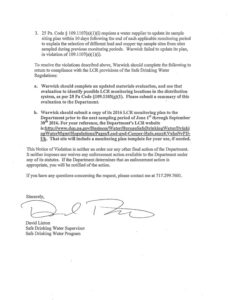
“According to records provided by Warwick, several sites were resampled during the monitoring completed in 2010 and 2013,” according to the notice. Taking multiple samples from the same home is not permitted in systems as large as Lititz and Rothsville.
If only four of the 30 samples required in 2010 had been over the federal limit, the township would have had to take corrective action and notify consumers.
Water providers must inform the state and consumers of the lead level that 90% of the sites test at or below. This is reported on drinking water quality reports as the “90th percentile,” an arbitrary number that is not tied to health outcomes.
Zimmerman has not responded to a request emailed yesterday for comment regarding the violations issued by the state.
Federal and state regulations require water utilities to identify and test tap water in homes that are at highest risk for lead contamination: those known to have lead service lines, lead pipes, or those built between 1982-1985 copper pipes with lead solder.
LititzDailyNews.com reported in February that during 2010 and 2013 testing the township exclusively sampled homes at lower risk for lead in both the Lititz and Rothsville systems, according to documents the township filed with the state and obtained under the Right-to-Know Law.
The township told residents the water was safe to drink, while testing in Rothsville during 2013 showed that over 10% of homes had 11 parts per billion (ppb) of lead in water, the same amount of lead reported for the first six months of 2015 to consumers by officials in Flint.
Edwards and his team at Virginia Tech found levels of lead in Flint water that far exceeded the reported levels and the 15 ppb federal limit.
On a street in Rothsville where two lower-risk homes were sampled, what appear to be half a dozen high-risk homes identified through real estate records by LititzDailyNews.com went untested.
“The worst thing you can do is to not test the worst-case homes,” said Edwards.
Edwards believes that continued claims by the state, Warwick Township, and Lititz Borough that the water is safe to drink based on the 2013 lead in water testing is not scientifically sound.
“The whole rule is premised on you only sample a few houses to determine the safety of an entire town or city,” said Edwards. “If you’re not testing the worst-case homes, the sampling is worthless.”
Some residents are wondering what, if any, consequences are in store for those tasked with oversight of the township testing protocols. On its webpage, the township authority continues to claim the water is safe to drink and that it met all US EPA sampling standards.
Because high lead levels can cause irreversible harm, Edwards believes the township must be required to immediately notify residents of the violations.
“They should be treating the town like it’s failed the Lead and Copper Rule. People should be told it did not pass the federal law for lead and copper,” said Edwards. State officials did not require the township to notify residents of the violations.
As Lititz-area residents reacted to news yesterday that a higher percentage of Lititz-area children have lead poisoning than children in Flint even after the switch in Michigan water sources, some wonder what, if any, consequences await those responsible for failed oversight of Lititz water testing.
“Water utilities, states, and the EPA have spent over 20 years making ‘normal’ a culture of unlawfulness, indifference, and deception that has left fetuses, infants, and young children unprotected from lead in water,” said Yanna Lambrinidou, a national water policy expert who is a colleague of Edwards. “PA DEP’s enforcement of the law in Lititz is a critical first step toward fixing this culture and creating a new normal of lawfulness and public health protection in PA and across the US.”
“PA DEP’s enforcement of the law in Lititz is a critical first step toward fixing this culture and creating a new normal of lawfulness and public health protection in PA and across the US.”-Yanna Lambrinidou, water policy expert, Virginia Tech ethics professor
In its letter to the township, the state outlined corrective procedures for Warwick Township, but did not impose a fine or other enforcement action, although it hasn’t ruled out that option.
Lead is known to cause neurological damage in infants, children, and developing fetuses leading to behavioral disorders, ADHD, and developmental delays. It also poses serious health risks to pregnant women and other adults. State and federal agencies agree that there is no safe level of lead in drinking water.
Lead leaches into water as it enters homes through lead service lines, lead connections, or copper pipes with lead solder. Corrosive source water can cause the lead to be released from pipes into homes, like it did in Flint, Michigan.
In order to determine which homes are at highest risk for lead at the tap, water suppliers must evaluate the materials and look for lead in their systems, then report those findings to the state prior to testing.
Pennsylvania regulators say that Warwick Township failed in that regard also.
“Although Warwick states that this evaluation was completed, it admits that its review was not complete, and some homes were incorrectly classified.” The notice issues a violation for “failure to conduct an adequate evaluation to locate appropriate lead and copper tap sampling sites.
Since the township is required to test for lead in tap water again this year, the state has required that it submit a detailed plan of where it intends to sample prior to June 1, the start of the next testing period.
Lititz Borough and Severn Trent Services, a private company that operates the Lititz Borough system, were similarly found in violation of the Safe Drinking Water regulations and received notice of violation in March. Warwick Township buys water from Lititz Borough and distributes it to township customers in Lititz.
The state investigations of the Warwick Township and Lititz Borough water systems was prompted by a series of stories on lead in Lititz drinking water published by LititzDailyNews.com that exposed questionable testing practices, erroneous reports sent to residents, and high lead levels in certain homes.
The Pennsylvania Department of Environmental Protection is responsible for overseeing and enforcing drinking water regulations. It is unclear why violations by Warwick Township and Lititz Borough went unnoticed by state officials for over five years. The state only recently determined that Lititz Borough reported incorrect lead test results to residents in its 2011 and 2012 reports.
A request made last week by LititzDailyNews.com for an interview with PA DEP Secretary Quigley and water supervisor David Linton has not received a reply. A request for immediate comment emailed yesterday regarding the Warwick Township violations has not yet received a response from the state.
Edwards believes the seriousness of the violations call for Pennsylvania officials to take enforcement action.
“They should do their job, which is to enforce the law,” he said.
Click here to subscribe for FREE to LititzDailyNews.com and receive upcoming stories about lead in drinking water. Contact us by email or through our Facebook page if your child has been tested and shown high levels of lead in the blood.
How to Connect with Your Government
Information for contacting state and municipal officials and to engage with local leaders at municipal meetings that are open to public comment is found below:
The Warwick Township Municipal Authority (WTMA) meetings are open to the public, and members of the community may address the board during the public comment portion of the monthly meeting held on the third Tuesday of each month at 315 Clay Road, Lititz. The next meeting will be held on May 17 at 7 p.m.
Dan Zimmerman, Warwick Township Manager/WTMA Administrator Email: [email protected] Phone: (717) 626-8900
Warwick Township Supervisors who oversee personnel matters concerning the Township Manager are: W. Logan Myers, III; Michael Vigunas; C. David Kramer; Herbert Flosdorf; Kenneth Eshleman.
Email: [email protected] Phone: (717) 626-8900
The Board of Supervisors meeting is open to the public who are allowed opportunity for comment. The next meeting of the Board of Supervisors is scheduled for Wednesday, May 18, 2016 at 7:00 p.m.
PA Bureau of Safe Drinking Water: (717) 787-9633
Click here to subscribe for FREE to LititzDailyNews.com and receive upcoming stories about lead safety.
Correction: The story originally said David Linton was the state drinking water supervisor. It has been corrected to read he is a drinking water supervisor for the state.
If you live in Lititz Borough, Warwick Township, Rothsville, or anywhere in the 17543 ZIP code and have a child who has tested with an elevated blood lead level, please email [email protected] today. For tips on how to reduce your exposure to lead, visit the Lead in Drinking Water page of the Pennsylvania Department of Environmental Protection.

